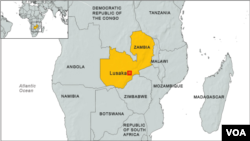Hello again, and welcome to As It Is from VOA Learning English! I’m George Grow.
The World Health Organization says vaccinations have been shown to be more effective in reducing deaths than any modern development, other than clean water. On the show today, we look at efforts in Africa to protect people against the sometimes deadly disease meningitis.
But first, Milagros Ardin tells us about a government vaccination program in Zambia. Its goal is to protect school girls against human papillomavirus, better known as HPV. The virus is known to cause cervical cancer, and can spread through sexual contact.
Zambian Government Working to Prevent Cervical Cancer
Zambia has one of the highest rates of cervical cancer in the world. Ninety of every 100,000 Zambian women get the preventable disease. The Zambian government recently launched a program to vaccinate school girls against HPV.
The government hopes to vaccinate school girls between the ages of 9 and 11 against HPV. The program was launched in May at several schools. One of them is the Kalingalinga Primary School in Lusaka. About 100 students there received the HPV vaccine.
Euphrasia Mweshi Mutale is a teacher. She was involved in efforts to inform the community about what was expected to be a sensitive subject. She says people involved in the program met with parents and teachers to tell them why it is good to vaccinate the girls. She notes there have been no immediate reported side effects from the vaccine, like high body temperature or skin discoloration.
Mulindi Mwanahamuntu is a director of the Cervical Cancer Prevention Program in Zambia. He says health officials wanted to vaccinate 25,000 girls as part of the program. But he says there was some resistance from churches and other groups.
“The very fact that it is given to pre-sexual years it would indicate to others that we are permitting children therefore to go out and have sex.”
Zambian and international health officials are working to break the resistance by educating communities in different ways. Doctor Pelum-Hazeley is with the United Nations. She stars in a local radio program called Celebrating Life. Her program aims to educate listeners on medical issues so they can make the right decisions for their children.
“We just have to continue educating the people because if someone has had a complication, and of course there are reasons why there are complications, it does not necessarily mean the same thing is going to happen here.”
The World Health Organization rates Zambia third on its list of highest death rates from cervical cancer. The country also has the highest cervical cancer rate in Africa.
I’m Milagros Ardin.
You are listening to As It Is, from VOA Learning English. I’m George Grow in Washington.
The Lancet medical journal recently published a study with good news in the fight against meningitis. The study found that a new vaccine being used in Chad reduced the number of meningitis cases by 94 percent. Christopher Cruise has the story.
New Meningitis Vaccine a Success in Chad
Researchers have described the new vaccine as the first meningitis vaccine developed specially for Africa. They say it “dramatically reduced” the number of cases in Chad and stopped the disease from spreading.
The World Health Organization says meningitis affects nearly 500 million people every year in African countries south of the Sahara Desert. The disease can be deadly, often killing people who were treated for it.
James Stuart is a professor at the London School of Hygiene and Tropical Medicine. He helped to write a report on the new vaccine, known as MenAfriVac. It targets the type-A form of the disease.
Dr. Stuart and other researchers looked at the effects of MenAfriVac vaccine on 1.8 million people across three areas in Chad. All those receiving the vaccine were under the age of 29. The study took place during the 2012 meningitis epidemic, when the disease infected many people.
Dr. Stuart says the number of meningitis cases dropped in the part of the country that was vaccinated. He says MenAfriVac completely prevented type A meningitis in all of the vaccinated areas. But the disease continued spreading in other areas.
“Although it wasn’t a trial, it suggested that the vaccine was having a very positive effect on protecting people against meningitis.”
The disease can spread quickly, passing from person to person through bacteria that live in the throat. The World Health Organization says more than one million cases of meningitis have been reported in Africa since 1988. The highest incidence of the disease is reported in sub-Saharan Africa.
Dr. Stuart says no other meningitis vaccines have proven to be as effective as MenAfriVac.
“The new vaccine seems to stop people carrying the germ and stop it being therefore transmitted, whereas the old vaccine did not have an effect on carriage, so it didn’t stop the germ being transmitted between people.”
He says that the vaccine will sell for less than 50 cents per person in sub-Saharan Africa. He also says it can be included as part of normal preventative vaccinations for children.
Researchers continue to study the long-term effects of the drug. But Dr. Stuart says there have not been any signs of harmful side effects in individuals who were treated.
I’m Christopher Cruise.
That’s our show for today. I’m George Grow. Thanks for listening. Do have a question or a comment about our show? Or maybe you have an idea for a future show. We would love to hear from you. Send an email to learningenglish@voanews.com. Or visit our website at learningenglish.voanews.com and click on “Contact Us.” We are also on Facebook, YouTube, LinkedIn, iTunes and Twitter at VOA Learning English.
We are sorry, but this feature is currently not available






